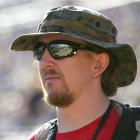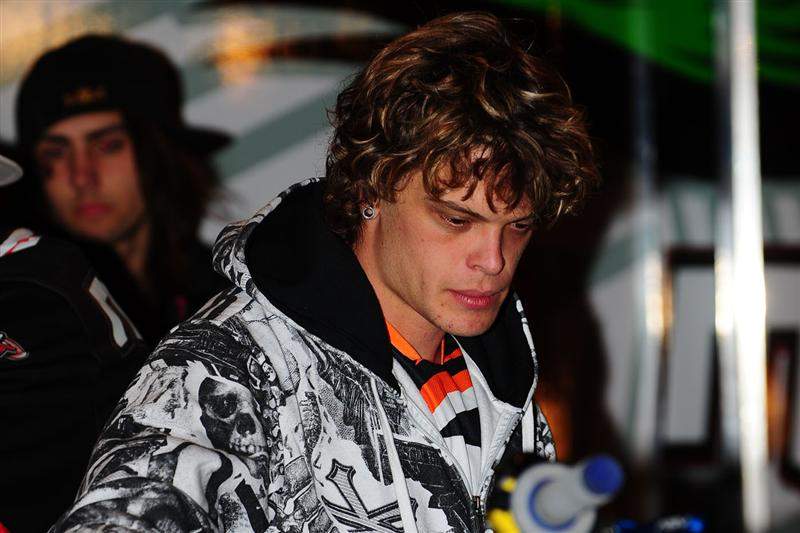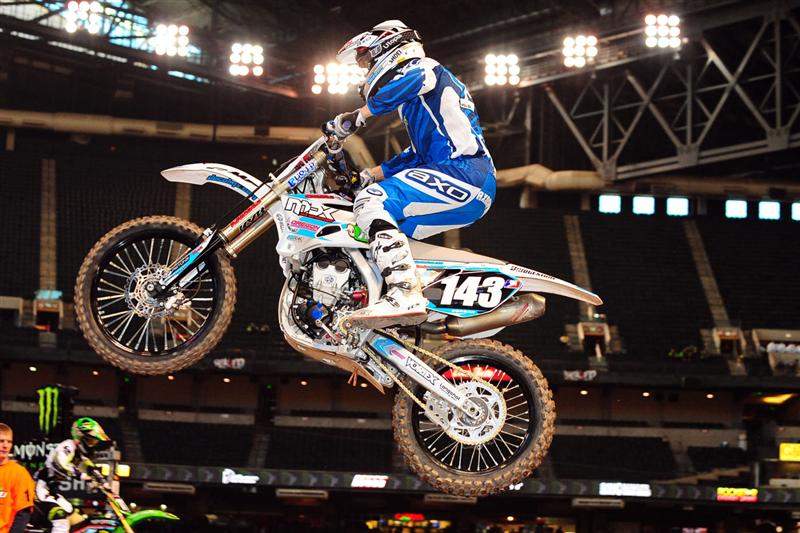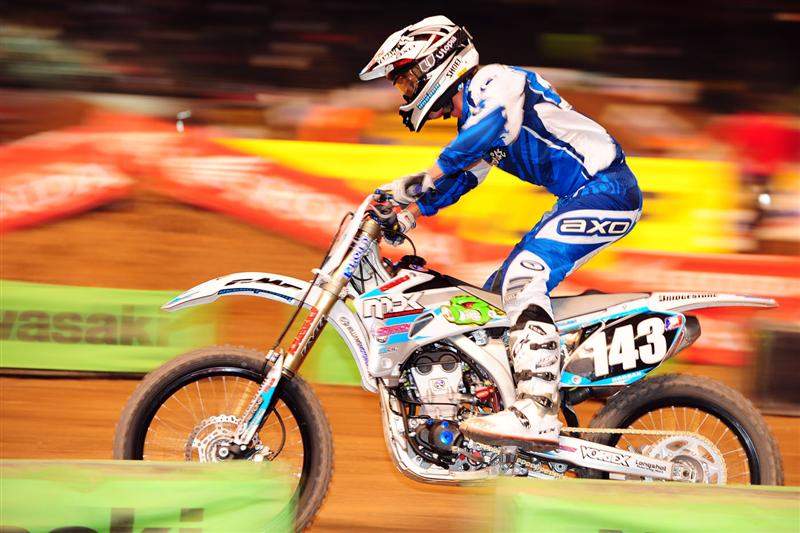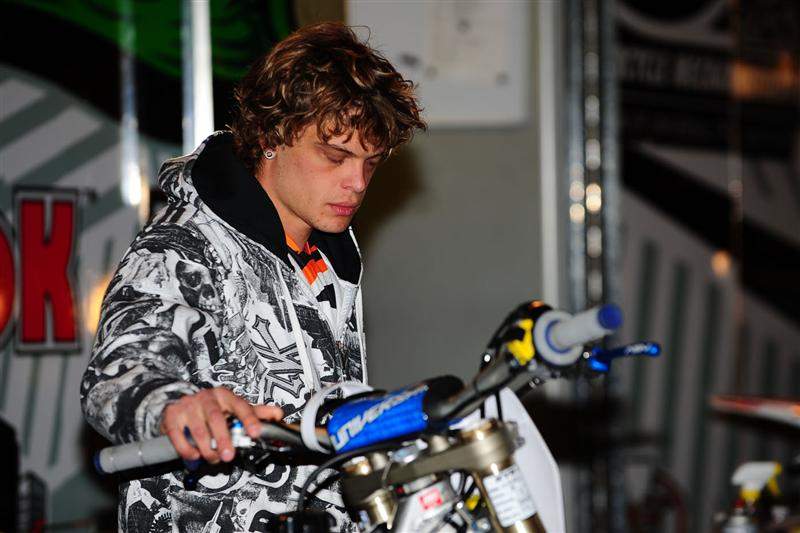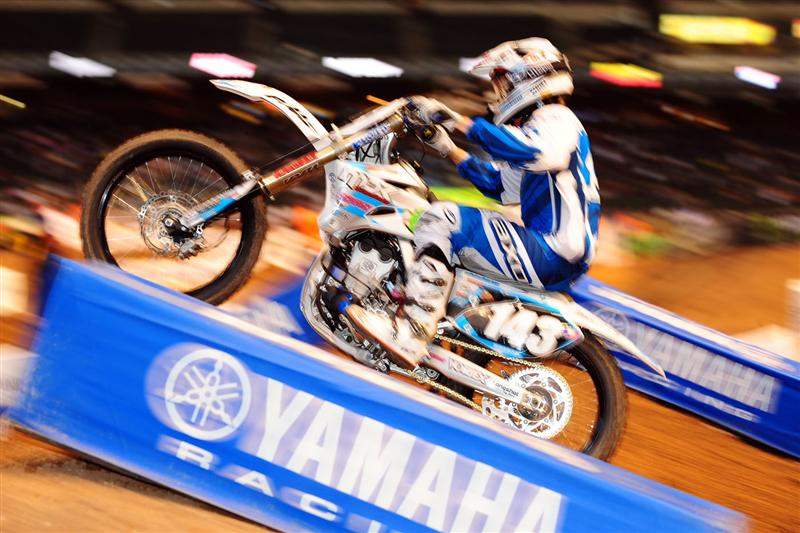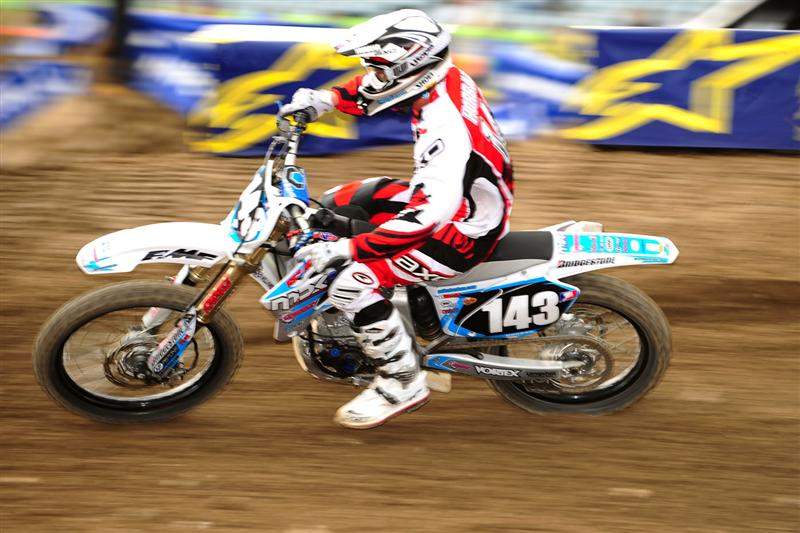Grant has been hot in supercross lately, with Josh Grant leading the points, and Grant’s Pass, Oregon’s Mike Horban making his first-ever main event. Okay, so that’s a stretch, but 22-year-old Horban has only been racing seriously since he was about 17 years old, and raced the West series last year. At Anaheim I this year, he made his first main event. We talked to the Wonder Warthog rider for this week’s Privateer Profile.
Racer X: Take us through your career up to this point.
Mike Horban: Basically, I started racing at a young age, when my dad was taking me racing and stuff, but I never got into it – I would just go every once in a while – and I started taking it seriously when I was probably about 17. I was a Beginner when I was about 16 years old, so I didn’t do any amateur stuff. I turned pro when I was 19, and I’m 22 now, and I rode supercross last year and now this year.
Do you feel like you missed out on a lot by getting serious so late? Or do you feel like maybe it helps you keep from getting burned out?
I don’t look at it like it’s a problem, I just look at it like you get into it how you get into it, and that’s just how it goes. I think it’s good for me, because I won’t be burned out like a lot of the other kids get, so it could be good.
Obviously, there are other guys who got late starts, like John Dowd and Guy Cooper, so it’s not impossible. It just doesn’t seem like the norm anymore.
Right, and I think even Jeremy McGrath wasn’t a real fast amateur kid, you know?
So as a pro, how has it gone for you? How difficult is supercross for a guy like you?
Supercross is definitely real tough. Last year was real hard for me – it was a real learning experience – and I just had a lot of nerves going into it. Basically, those were my first real big races that I’ve ever done, so that was tough. This year, I seem to be a lot better, and I have a great mental coach, Brian McDonald, and he helps me out a lot with the mental part of my game.
So is the biggest part of your improvement in your head? Or have you put forth effort to improve your technical riding abilities, too?
It’s my head, and definitely I’ve been riding a lot this year. I rode a lot getting ready for Anaheim I, and I ended up getting hurt about three weeks before A1 – I separated my collarbone from my shoulder – so it was pretty tough for me. But other than that I’m feeling really good.
But you made the main event at Anaheim for the first time ever, right?
Yeah. It was super-exciting, with me and the whole Warthog team, and my dad, and everybody. We were all really pumped.
Mike Horban: Basically, I started racing at a young age, when my dad was taking me racing and stuff, but I never got into it – I would just go every once in a while – and I started taking it seriously when I was probably about 17. I was a Beginner when I was about 16 years old, so I didn’t do any amateur stuff. I turned pro when I was 19, and I’m 22 now, and I rode supercross last year and now this year.
Do you feel like you missed out on a lot by getting serious so late? Or do you feel like maybe it helps you keep from getting burned out?
I don’t look at it like it’s a problem, I just look at it like you get into it how you get into it, and that’s just how it goes. I think it’s good for me, because I won’t be burned out like a lot of the other kids get, so it could be good.
Obviously, there are other guys who got late starts, like John Dowd and Guy Cooper, so it’s not impossible. It just doesn’t seem like the norm anymore.
Right, and I think even Jeremy McGrath wasn’t a real fast amateur kid, you know?
So as a pro, how has it gone for you? How difficult is supercross for a guy like you?
Supercross is definitely real tough. Last year was real hard for me – it was a real learning experience – and I just had a lot of nerves going into it. Basically, those were my first real big races that I’ve ever done, so that was tough. This year, I seem to be a lot better, and I have a great mental coach, Brian McDonald, and he helps me out a lot with the mental part of my game.
So is the biggest part of your improvement in your head? Or have you put forth effort to improve your technical riding abilities, too?
It’s my head, and definitely I’ve been riding a lot this year. I rode a lot getting ready for Anaheim I, and I ended up getting hurt about three weeks before A1 – I separated my collarbone from my shoulder – so it was pretty tough for me. But other than that I’m feeling really good.
But you made the main event at Anaheim for the first time ever, right?
Yeah. It was super-exciting, with me and the whole Warthog team, and my dad, and everybody. We were all really pumped.
What is it like to finally reach a goal like that and make a main event?
It’s definitely a confidence-booster. Now I have the feeling that I know I can be in there, and I can be doing it, you know?
So what happened at Phoenix?
Phoenix went pretty good. I felt like I was riding good, but I just got bad starts and struggled with that a little bit. Other than that, I felt really good. I got fourth in my LCQ, so it’s not terrible.
So you must feel like you’re on the cusp of qualifying at any time...
Definitely. My goal is to make as many main events as I possibly can this year, you know? And get my name out there a bunch more.
What about the future? What do you want to do as a racer from here on out?
If I make main events, I just hope to be able to get a ride and maybe be able to do nationals and all of that. But right now, we only have enough money to do supercross. It costs a lot to do the Nationals since they’re all on the east coast and whatnot, so it’s tough.
Who would you like to thank?
I really need to thank Oregon Motorsports for my bike, because without them it would be hard to even ride during the week – I would probably just have one bike, so... Also, I need to thank Wonder Warthog – Darrel and Scott are awesome guys there – and Nick at DeCal Works, Axo, Utopia, TCX boots, Boney’s Bonez, Motolife, Williams Motowerx, Heroic Threads, FMF... And also, I’ve got to thank a couple of people: Bill and Chase Rocky, and then I need to thank Brad and Sadie who help me out a lot with a local track in my town called Southern Oregon Arenacross, and then also all the sponsor that help out Wonder Warthog, and of course my parents, because without them, I definitely wouldn’t be here.
It’s definitely a confidence-booster. Now I have the feeling that I know I can be in there, and I can be doing it, you know?
So what happened at Phoenix?
Phoenix went pretty good. I felt like I was riding good, but I just got bad starts and struggled with that a little bit. Other than that, I felt really good. I got fourth in my LCQ, so it’s not terrible.
So you must feel like you’re on the cusp of qualifying at any time...
Definitely. My goal is to make as many main events as I possibly can this year, you know? And get my name out there a bunch more.
What about the future? What do you want to do as a racer from here on out?
If I make main events, I just hope to be able to get a ride and maybe be able to do nationals and all of that. But right now, we only have enough money to do supercross. It costs a lot to do the Nationals since they’re all on the east coast and whatnot, so it’s tough.
Who would you like to thank?
I really need to thank Oregon Motorsports for my bike, because without them it would be hard to even ride during the week – I would probably just have one bike, so... Also, I need to thank Wonder Warthog – Darrel and Scott are awesome guys there – and Nick at DeCal Works, Axo, Utopia, TCX boots, Boney’s Bonez, Motolife, Williams Motowerx, Heroic Threads, FMF... And also, I’ve got to thank a couple of people: Bill and Chase Rocky, and then I need to thank Brad and Sadie who help me out a lot with a local track in my town called Southern Oregon Arenacross, and then also all the sponsor that help out Wonder Warthog, and of course my parents, because without them, I definitely wouldn’t be here.

